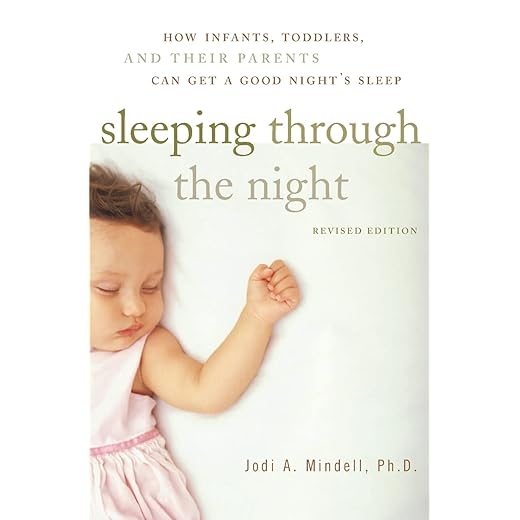Key Highlights
- Sleep training can be controversial among parents but is helpful in establishing healthy sleep habits for toddlers.
- Various sleep training books, such as “The Gentle Sleep Solution” by Chloe Frazier, “Sleeping Through the Night” by Dr. Jodi Mindell, “The No-Cry Sleep Solution for Toddlers” by Elizabeth Pantley, “Good Night, Sleep Tight” by Kim West, and “The Sleepeasy Solution” by Jennifer Waldburger and Jill Spivack, offer different approaches and techniques.
- These books provide gentle methods, behavioral techniques, a no-cry approach, customizable plans, and quick solutions to address sleep challenges, establish bedtime routines, adjust nap times, create soothing sleep environments, and manage night wakings.
Sleep is crucial for both you and your child’s health and well-being, but getting your toddler to sleep soundly can feel like an uphill battle.
As per The National Survey of Children’s Health (NSCH), most Amercan babies do not get enough sleep. Hence, it is extremely important that you sleep train your baby from an early age.
As a new parent, you might be searching for the best ways to ensure your little one gets the rest they need. This is where sleep training books can be a game-changer.
In this article, I’ll introduce you to some of the most effective and insightful books on sleep training that can help you navigate the often tricky world of toddler sleep. I’ll also share the key learnings I’ve gained from reading these books, providing you with practical tips and insights to implement in your own home.
Whether you’re looking for gentle methods or more structured behavioral techniques, these books offer a range of approaches to fit different parenting styles and preferences.
So, let’s dive into these top sleep training books and find the perfect one for you and your family.
5 Interesting Books On Sleep Training
When it comes to sleep training books, there are several ones that cater specifically to toddlers. These books provide valuable insights, tips, and strategies for parents to help their toddlers establish healthy sleep habits. Whether you prefer a gentle approach, behavioral techniques, or customizable plans, there is a sleep training book out there for you.
Here are five essential sleep training books for toddlers that I recommend you read:
1. “The Gentle Sleep Book” by Sarah Ockwell Smith
Sarah Ockwell Smith’s “The Gentle Sleep Book” has been a cornerstone in my journey as a parent.
This book not only offers invaluable insights into nurturing healthy sleep patterns in infants but also emphasizes gentle techniques that prioritize understanding a baby’s needs and providing comfort without resorting to harsh sleep training methods.
One aspect I deeply appreciate about Ockwell Smith’s approach is her promotion of a baby-led philosophy. This philosophy has helped me create a calming sleep environment that supports improved sleep quality for my baby. Following the guidance in this book has not only enhanced our bedtime routines but also minimized nighttime disruptions, creating a tranquil atmosphere that benefits both my baby and me.
Beyond creating a peaceful sleep setting, “The Gentle Sleep Book” covers crucial topics such as nap schedules, bedtime rituals, and recognizing signs of tiredness. Ockwell Smith’s practical advice on responding sensitively to my child’s cues has been instrumental in fostering healthy sleeping patterns from an early age.
Implementing the principles advocated by Ockwell Smith has led to positive changes in my child’s sleep behavior and overall well-being. This book has been a trusted resource, offering compassionate guidance that aligns with my parenting values and supports a nurturing approach to infant sleep.
2. “Sleeping Through the Night” by Dr. Jodi Mindell
Dr. Jodi Mindell’s “Sleeping Through the Night” has been a cornerstone for me in understanding how to help my toddler sleep better. This comprehensive guide offers behavioral techniques and strategies specifically aimed at establishing healthy sleep habits. Dr. Mindell stresses the importance of consistency in bedtime routines, which has been a game-changer in our household.
What I appreciate most about this book are the practical tips for addressing common sleep challenges like night wakings and bedtime resistance. Dr. Mindell’s insights have empowered me to approach these issues with confidence and a structured plan. Her methods are not only effective but also respectful of my child’s individual needs and development.
“Sleeping Through the Night” is highly recommended by both parents and sleep experts. I can personally attest to its value in helping toddlers sleep soundly through the night.
3. “The No-Cry Sleep Solution for Toddlers” by Elizabeth Pantley
If you’re seeking a gentle and compassionate approach to sleep training, “The No-Cry Sleep Solution for Toddlers” by Elizabeth Pantley is an excellent choice.
Pantley, a parenting expert, offers practical tips and strategies based on her extensive research and experience. Her method focuses on creating a soothing sleep environment and establishing healthy sleep habits for toddlers without resorting to traditional cry-it-out methods.
One of the key insights from Pantley’s book is her emphasis on understanding the underlying reasons behind sleep issues and addressing them proactively. She encourages parents to observe and respond to their toddler’s cues, fostering trust and security during bedtime routines. By incorporating Pantley’s gentle techniques, parents can effectively manage night wakings, bedtime resistance, and other common sleep challenges with patience and empathy.
I found Pantley’s approach particularly valuable in my own parenting journey. Her alternative methods respect the individual needs and emotions of toddlers, promoting a positive sleep experience for both child and parent. As a result, I’ve been able to navigate sleep training with confidence, knowing that I’m supporting my child’s healthy development and emotional well-being.
4. “Good Night, Sleep Tight” by Kim West
Kim West’s “Good Night, Sleep Tight” is a trusted resource for parents seeking customizable sleep plans that cater to their toddler’s unique needs. This book provides clear, step-by-step instructions on establishing a consistent sleep routine and offers practical strategies for addressing common sleep challenges effectively.
West emphasizes the importance of consistency in her approach, which I’ve found crucial in maintaining a structured bedtime routine for my child. Her methodical guidance helps create a peaceful sleep environment that supports healthy sleep habits and overall well-being.
What I appreciate most about “Good Night, Sleep Tight” are the customizable plans that allow me to tailor the strategies to fit my child’s temperament and our family’s lifestyle. From managing bedtime resistance to easing night wakings, West’s practical advice has been invaluable in navigating various sleep issues with confidence.
5. “The Sleepeasy Solution” by Jennifer Waldburger and Jill Spivack
“The Sleepeasy Solution” by Jennifer Waldburger and Jill Spivack is a highly regarded resource for parents seeking practical and effective solutions to toddler sleep challenges. This book is particularly valuable for addressing sleep deprivation and guiding the transition to independent sleep in toddlers.
Waldburger and Spivack’s approach focuses on teaching toddlers essential self-soothing skills and fostering independence at bedtime. Drawing from my training, I’ve learned that their methods emphasize consistency and gradual adjustments to bedtime routines, which are essential for establishing healthy sleep habits.
What stands out about “The Sleepeasy Solution” is its comprehensive yet accessible strategies that help parents navigate common sleep issues such as night wakings and bedtime struggles. By following their advice, parents can create a supportive sleep environment that promotes uninterrupted sleep for both child and parent.
Key Learnings from These Sleep Training Books
After delving into essential sleep training books for toddlers, several key strategies and techniques emerge that can significantly benefit parents in establishing healthy sleep habits and improving their toddler’s overall sleep quality:
1. Creating a Soothing Sleep Environment
Establishing a serene and conducive sleep environment is crucial. This involves using blackout curtains to block out light, maintaining a comfortable room temperature, and ensuring a supportive sleep surface like a firm mattress with minimal bedding.
2. Establish A Consistent Bedtime Routine
A structured bedtime routine helps toddlers recognize cues that bedtime is approaching. Activities such as a warm bath, reading a bedtime story, and gentle soothing techniques prepare them for sleep. Consistency in these routines reinforces the sleep-wake cycle.
3. Responsive Parenting to Toddler’s Needs
Understanding and promptly responding to a toddler’s cues during sleep disruptions are essential. This approach includes providing comfort through gentle touch, soothing words, or offering a favorite comfort item without overstimulation.
4. Gradual Adjustment and Changes
Making changes to sleep routines gradually allows toddlers to adapt more smoothly. Adjustments could involve modifying nap schedules to ensure they don’t interfere with nighttime sleep or transitioning toddlers gradually to sleeping independently in their own room.
5. Effective Use of Behavioral Techniques
Utilizing behavioral techniques, such as gradual withdrawal or implementing consistent responses to night awakenings, helps toddlers learn self-soothing skills and develop independence in falling and staying asleep.
6. Customizable Sleep Plans for Individual Needs
Tailoring sleep plans to meet the specific needs of each toddler fosters consistency and effectiveness. This customization considers factors like temperament, developmental stage, and family dynamics, ensuring the approach is sustainable and supportive.
7. Quick Solutions for Common Sleep Challenges
Implementing quick solutions for managing common sleep challenges, such as addressing sleep deprivation or facilitating smooth transitions between sleep stages, aids in maintaining overall sleep quality and promoting healthier sleep patterns.
By integrating these detailed strategies into daily routines with patience and persistence, parents can create a nurturing sleep environment that supports their toddler’s physical, emotional, and cognitive development while enhancing their own well-being through improved sleep quality. These insights gleaned from sleep training literature provide a comprehensive toolkit for navigating the complexities of toddler sleep with confidence and effectiveness.





Frequently Asked Questions
What is the best age to start sleep training?
The best age to start sleep training can vary depending on the individual child and their developmental readiness. Most experts recommend waiting until the baby is around 4 to 6 months old. This is when they have developed the ability to self-soothe and are better able to establish a sleep routine. However, it’s important to consider your child’s unique needs and consult with your pediatrician before starting sleep training.
Can sleep training methods harm my child in any way?
When done in a gentle and informed manner, sleep training methods are generally considered safe and do not harm children. It’s important to choose an approach that aligns with your parenting philosophy and values and to provide comfort and reassurance to your child throughout the process. Attachment and bonding can still be fostered through sleep training methods that prioritize responsiveness and nurturing.
How long does sleep training typically take to see results?
The duration of sleep training can vary depending on the child and the method used. Some children may respond quickly, while others may take longer to adjust. Consistency is key, and it’s important to give the child time to adapt. Many parents start to see improvements within the first week of sleep training.
What if sleep training isn’t working for my toddler?
If sleep training methods are not working for your toddler, it’s important to reassess the approach and consider other factors that may be influencing their sleep. This may include reviewing their bedtime routine, adjusting nap times, or seeking guidance from a sleep consultant or pediatrician. Every child is different, and it’s important to find an approach that works for your family.
Find the Right Sleep Training Book for Your Toddler
Choosing the right sleep training book can make a significant difference in helping your toddler establish healthy sleep habits.
Each book I have covered here offers unique strategies that cater to different parenting styles and child behaviors. Implementing these methods at home, such as setting up a consistent bedtime routine and creating a soothing sleep environment, can greatly improve your toddler’s sleep quality.
It’s essential to stay patient and consistent while applying these techniques. By understanding your child’s individual needs and preferences, you can find a sleep training approach that works best for your child.
Also, do not forget to read some other tips on How To Take Care Of Your Child At Night if you want your child to sleep peacefully and give you some peaceful rest too.





Leave a Reply